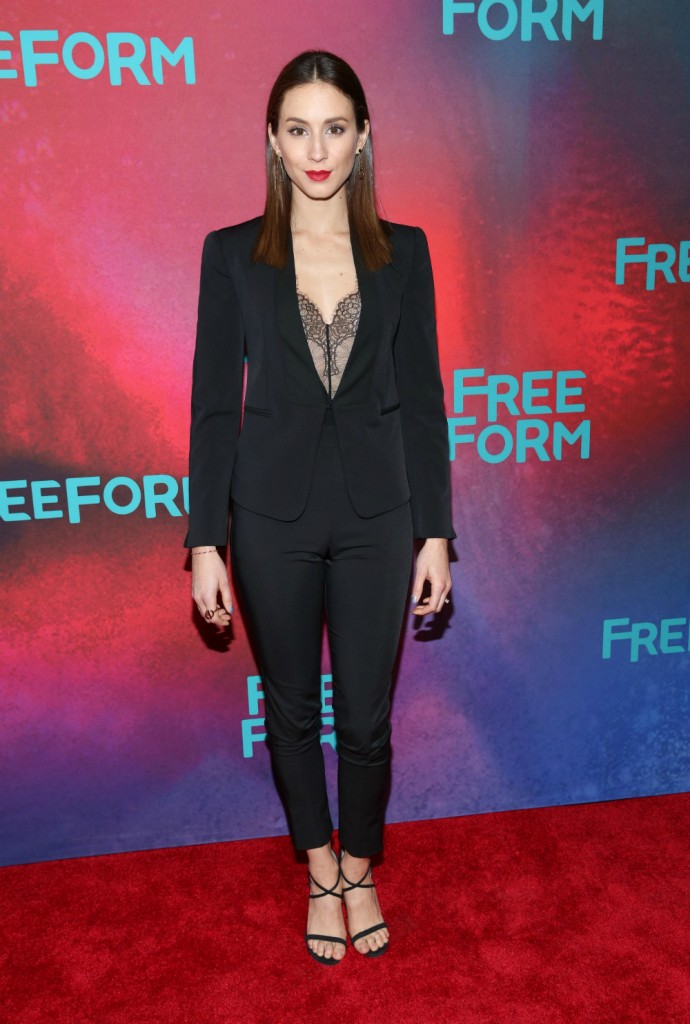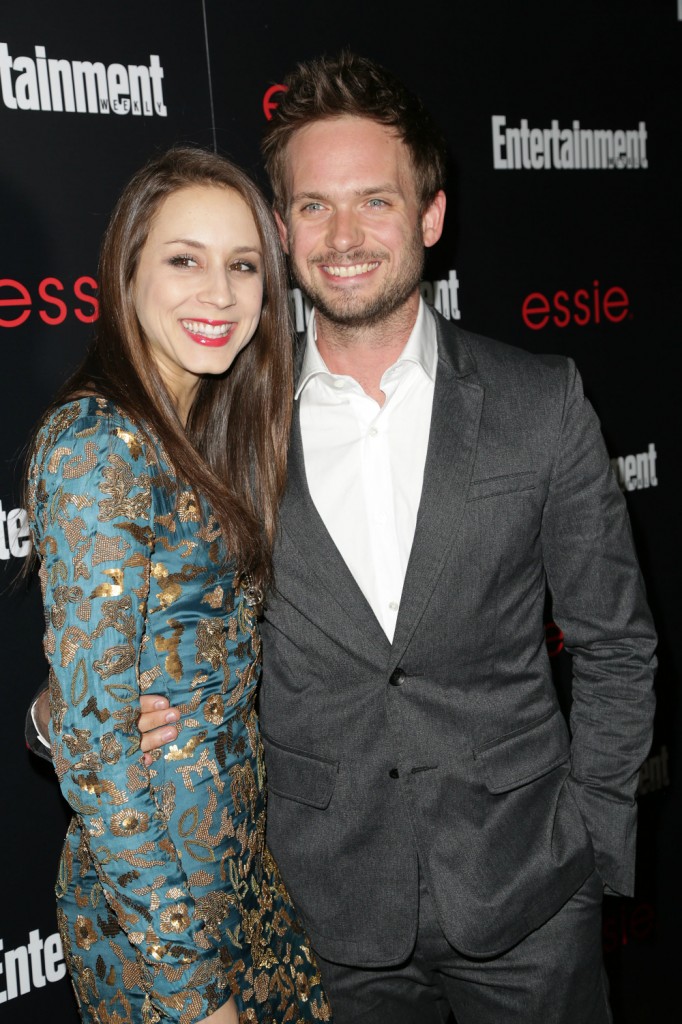Last month CB wrote about Troian Bellisario as she began her promotion for her movie Feed. The film, which she wrote, directed and stars in, deals with affluence, eating disorders and grief. Much of the story was pulled from Troian’s own experience with anorexia. Troian, who up until now is best known for her role on Pretty Little Liars, is the daughter for two successful Hollywood producers, Donald Bellisario and Deborah Pratt and is married to Suits star, Patrick J. Adams. In 2014, Troian went public with her anorexia and has continued to speak about it to help educate others and bring awareness to all eating disorders. Troian was interviewed by her PLL director Lesli Linka Glatter for Interview Magazine. It starts off more like Troian is interviewing Lesli but it evolves into an insightful dialogue in which Troian talked about how difficult is was to film Feed, primarily what it was like to revisit her anorexia in such a way. You can read the full interview here. Below is when Lesli asked Troian what it was like to step back into that place.
GLATTER: So many people wait and don’t take the active measure to go create something; they’ll be more reactive. The fact that you have taken that step, as well as being an actor in other people’s work, I think that’s an incredible balance to strike in your storytelling career. Did people understand—did your family and boyfriend and the people around you? I remember reading the script and thinking, “This is really powerful and personal and very moving.”
BELLISARIO: Thank you. They were all very supportive. They were all very afraid, which I totally understand. They’d been through hell watching me and feeling powerless themselves. And here I was saying, “Hey guys, I know that I’ve gone through a lot of therapy and a lot of heartbreak to make myself strong enough to live without this thing, but I’m actually going to make a movie where I go back and engage with it fully.” It was not easy; it was like engaging with an addiction. One of the things I really wanted the film to explore was that once you have this relationship, once you have this mental illness or this disease, it never really goes away. Your synapses are wired in a way that you will always feel this compulsion, but as you grow older and create a healthier life and go through lots of therapy, you tend to feel more empowered when it comes to making these choices. My neural pathways were all still there and connected to the disease, so when I had to engage with the film, it was like poking a sleeping dragon. It was amazing for me to realize, “Oh god, this is still all just lying under the surface. I’ve just gotten really good at either ignoring it or choosing to not engage with it.” But it’s amazing that you can have this huge, life-threatening thing be a part of you and still live inside of you, and almost tame it in a weird way.
She does a really good job of explaining a recovered addicts’ relationship with addiction. Obviously not all truths are the same for everyone but one constant is that an addiction never goes away. I know a lot of people who discuss “beating” addiction and I would say in their cases that is a completely accurate term. But I relate to the idea of “taming” an addiction as Troian introduces it. It may just be semantics to an outsider but understanding your relationship with addiction is one of the best tools in coping with it.
As for Troian’s relationship with anorexia, I’m glad she found this film cathartic. I can’t begin to think of all the emotions filming Feed must have brought up. You can see the trailer here – oh my gawd, it looks intense. And it definitely speaks to the control she referred to. Troian falls into the nepotism hire category given her parentage. However, she’s proved herself to be politically active and tends to use her public platform to promote causes about which she’s passionate (and educated). If Feed is as good as its trailer, it looks like she has some real chops too. Troian has just come on to my radar but now that she’s there, I’ll be paying much more attention to her. I like the cut of her jib… and I really want to see this film. It comes out July 18.
Photo credit: WENN Photos and Getty Images















Once the wires between starving and full get crossed in the brain, they can easily get crossed again.
Even the constant barrage of diet commercials can do it.
I’m glad she found it useful to processing her disorder but it’s not a smart choice imo.
nepotism hire maybe, incredible actress and artist – definitely. She’s made me cry on PLL on more than one occasion. She’s amazing, I love her.
and I really relate to how she describes mental health issues or addiction staying inside you, just adapting your life around keeping it at bay and “taming” it
Good on her for speaking on this. I’ve never struggled with anorexia, but I developed body dysmorphia in my early teens which greatly impacted my eating habits for the worse. I’ve yet to “beat” it, but instead have learned about body positivity and strategies against disordered eating. In my experience, most disorders are like monsters that you have to appease in order to conquer.
I admire her for doing this. Also, it is great to see a woman’s name at the top of the bill!
Kudos to her, truly. I’m on the “other side” of bulimia from age 12-28 and while I’m 33 now there is not a day that goes by I don’t think about it. Not to mention I’ve put on so much weight as a result of other health issues, I think about going back constantly. It takes a tremendous amount of effort and insight to mindfully engage and reflect on those parts of life while still choosing to be healthy. Recovery from eating disorders is interesting, because the “drug of choice” (in a way) is something humans cannot live without. In the worst of my disorder I remember saying to someone struggling with alcoholism (and I’m not proud of this) recovering from my disorder was like asking them to only drink one glass of wine three times a day, they could learn to survive without alcohol, but we can’t survive without food. Of course, eating disorders and substance use disorders are incomparable, sure. But there is something strange about EDs, that we have to “tame the beast” and learn to live alongside the demons. It’s a bizarre juxtaposition of “it’s all about the food/food is the enemy” and “Food is just a piece of the problem/you need it to survive/it’s up to you to learn how to have a healthy relationship”. There is a phenomenal book out there I highly recommend to anyone with an interest in body issues called “Eating in the Light of the Moon” by Anita Johnston. It’s beautiful and looks at the relationship between women and food through various cultural lenses.
+1000000
I like how she talks about her anorexia. I’ve struggled with binge eating disorder since I was 18 (I’m 30, now), and while I’ve made loads of progress since I was younger, it’s still very much a problem for me. I do understand where it comes from and it doesn’t feel as out of control or scary anymore, but I do still have to work at it. I try not to look at is as a “bad” thing or something to be ashamed of or fight with. Because the more I try to repress urges to binge and tell myself I’m bad for having them, the stronger the urges get. I try to acknowledge the urges peacefully now, like, “Hey, I feel you. What’s up? What do you wanna tell me, desire-to-eat-this-entire-loaf-of-bread? Anything we can do to work this out that won’t involve feeling like crap tomorrow?” Making peace with the problem makes it easier to live with.
I started following her on Instagram because of her political posts, and I love her. She’s quick to call her show out and other actors for problematic tendencies. I remember ontd found her livejournal from her teen years (it’s now deleted) and she wrote candidly about her aneroxia. I think she suffered greatly from it
At 22, I never would have believed that this could be true! But she’s right. I was sick for a few years and thought, for a time, that I wouldn’t live to see 23. I turned 29 a few weeks ago.
I didn’t like the idea that I would always have to battle with it, but she’s also right about that, only it’s more like the occasional spat. I think age has something to do with it. I’ll never be a careless eater, but I care less about certain things and have relaxed a lot of my disordered rules. I’ll never suggest that you can grow out of that mindset – almost all of the women in treatment with me were in their 40s – but there is a certain wisdom that comes with aging that is freeing.
Tom Felton is in the movie?? Sold!
This sounds like an interesting movie and a very thoughtful woman.
As someone in recovery from disordered eating, I really appreciate this type of coverage.